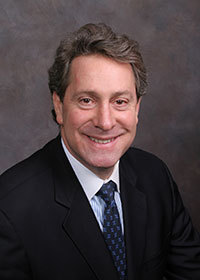Questions and Answers About COVID-19
 Lincoln P. Miller, MD, Section Chief of Infectious Disease, RWJBarnabas Health
Lincoln P. Miller, MD, Section Chief of Infectious Disease, RWJBarnabas Health
What is a novel coronavirus?
A novel coronavirus is a new coronavirus that has not been previously identified. The virus causing coronavirus disease 2019 (COVID-19) is not the same as the coronavirus that commonly circulates among humans and causes mild illness like the common cold.
What is COVID-19?
Coronavirus (COVID-19) is a respiratory illness that can spread from person to person that was first identified in Wuhan, China.
How does COVID-19 spread?
COVID-19 spreads from person to person. The virus is thought to spread between people who are in close contact with one another (within 6 feet) through respiratory droplets produced when an infected person coughs or sneezes. It may also be possible that a person can get COVID-19 by touching a surface or object that has the virus on it and then touching their own mouth, nose or eyes; however, this is not the main way the virus is thought to spread.
Who is most at risk for catching COVID-19?
Much like the flu, individuals with compromised immune systems are at a higher risk for catching COVID-19, including the elderly and those with serious medical conditions. If you are generally in good health, the risk for contracting COVID-19 is low.
What are the symptoms of COVID-19?
Patients with COVID-19 have mild to severe respiratory illness symptoms including:
- Fever
- Cough
- Shortness of breath
Additional symptoms include:
- Chills
- Repeated shaking with chills
- Muscle pain
- Headache
- Sore throat
- New loss of taste or smell
Symptoms that indicate an emergency include:
- Trouble breathing
- Persistent pain or pressure in the chest
- Confusion or inability to arouse
- Bluish lips or face
How can you prevent catching COVID-19?
- Wash hands often with soap and water for 20 seconds or more
- If soap and water is not available, use hand sanitizer with at least 60% alcohol
- Avoid touching your eyes, nose or mouth
- Stay home if you are sick
- Avoid contact with people who are sick
- Cover your mouth and nose with a tissue when coughing or sneezing, and then discard the tissue
- Clean and disinfect frequently touched objects and surfaces using a regular household cleaning spray or wipe
Should I wear a face mask?
The CDC recommends wearing cloth face coverings in public settings where other social distancing measures are difficult to maintain (e.g., grocery stores and pharmacies), especially in areas of significant community-based transmission.
What should I do if I have been exposed to COVID-19?
People who think they may have been exposed to COVID-19 should contact their health provider immediately. Do not come to the hospital unless advised by your primary health care provider. However, if you’re experiencing a health care emergency, call 911.
What if I don’t have a primary health care provider?
If you don’t have a primary health care provider, call the New Jersey Department of Health hotline at 1-800-222-1222 or you can schedule a virtual visit with a doctor through the RWJBarnabas Health TeleMed® App. For further information and details visit www.rwjbh.org/telemed.
How long is the incubation period?
Symptoms of COVID-19 can appear 2-14 days after exposure.
What should I do if I am exhibiting symptoms of COVID-19?
If you feel sick with a fever, cough, shortness of breath, chills, repeated shaking with chills, muscle pain, headache, sore throat, or new loss of taste or smell and have been in close contact with a person known to have COVID-19, or if you live in or have recently traveled to an area with ongoing spread of COVID-19 you should call your primary health care provider. Your primary health care provider will work with the state’s public health department and CDC to determine if you need to be tested for COVID-19.
What if I have medical questions about COVID-19 (not vaccine-related)?
For medical questions about COVID-19 that are not vaccine-related, you may:
- Visit the New Jersey COVID-19 Information Hub
- Call the New Jersey Department of Health Poison Center and Coronavirus Hotline at 1-800-962-1253
- Contact your primary care provider
Where can I get tested for COVID-19?
If you believe you may have come in contact with someone with COVID-19
or are exhibiting mild symptoms and want to be tested for the virus, please
speak with your primary health care provider. Your doctor will determine
your need for testing and your treatment options depending on the severity
of the situation.
NJ Testing Centers for COVID-19
Can I come to an RWJBarnabas Health hospital for testing?
Do not go to your nearest emergency room or urgent care center seeking testing. Call your primary health care provider first to assess the situation, unless you are having a true medical emergency.
What if I test positive for COVID-19?
If you test positive for COVID-19, you should stay home and avoid contact with others to avoid further spread of the virus.
How is COVID-19 treated?
There is no specific antiviral treatment recommended for COVID-19. People with COVID-19 should receive supportive care to help relieve symptoms. For severe cases, treatment should include care to support vital organ functions.
Is there a vaccine for COVID-19?
Currently there are vaccines available to prevent COVID-19 infections. Read more on the COVID-19 Vaccine FAQ.
What are the dangers of contracting COVID-19?
Approximately 80% of those infected with COVID-19 will only experience mild symptoms and not require hospitalization. In extreme cases, individuals have experienced pneumonia, multi-organ failure and death.
What is RWJBarnabas Health doing to ensure the health and safety of the communities it serves?
RWJBarnabas Health is continuing to work in close contact with the New Jersey Department of Health and the Centers for Disease Control to obtain to latest statistics and details. We are taking all necessary precautions to protect our patients and staff.
